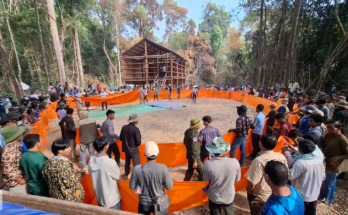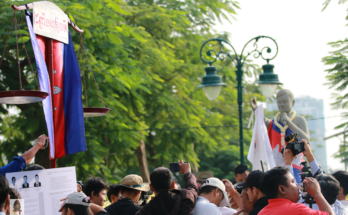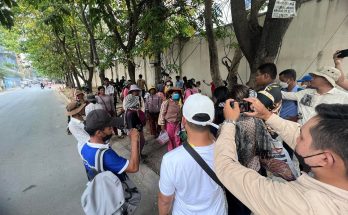The Court Of Appeal Should Have Granted Bail to Mam Sonando
Phnom Penh, 14 December 2012 – The Cambodian Human Rights and Development Association (ADHOC) wishes to express its disappointment at the decision made today by the Court of Appeal not to release Mam Sonando – the owner of independent Beehive Radio and president of the Democrats Association – on bail. Mam Sonando was arrested in July and sentenced to 20 years in prison on charges that were widely perceived to be politically motivated. His detention has sparked international outrage and has been condemned at the highest levels. The reasons given for the denial of Mam Sonando’s bail were completely unfounded.
Mam Sonando was arrested in July and sentenced to 20 years in prison on charges that were widely perceived to be politically motivated. His detention has sparked international outrage and has been condemned at the highest levels. The reasons given for the denial of Mam Sonando’s bail were completely unfounded.
The Democrats Association works to educate the Cambodian people about their rights, is registered with the Ministry of Interior, and has acted within the law when carrying out its activities. Mam Sonando has shown his commitment to the Cambodian judicial process in returning to the country to face trial and in his faith in the courts by conscientiously following the appeal process. Therefore, the idea that he may intimidate witnesses or cause public disorder is flawed.
The Court of Appeal today had the opportunity to show the Cambodian people and the international community that Cambodia was serious about its human rights obligations; instead, it demonstrated the disregard for human rights and fundamental freedoms, the pervasive political interference in the Cambodian judicial system and the shrinking democratic space in the country.
Support for Mam Sonando:
Following the decision made by the Court of Appeal to deny Mam Sonando’s bail request, his supporters, many of whom had gathered outside Wat Bottum to pray for him during his trial, marched to the Office of the High Commissioner for Human Rights (OHCHR) to protest the decision. The protesters waited to meet the United Nations Special Rapporteur on Human Rights, Professor Surya Subedi, who reiterated his commitment to assisting Cambodian people in protecting their human rights. Professor Subedi told the crowd he appreciated their courage in protesting for their rights and that he would discuss the case of Mam Sonando with high-ranking officials in the Cambodian government. Mam Sonando’s detention has therefore drawn criticism from protesters and international observers alike, and the refusal to grant him bail, in a case in which he never should have been arrested having committed no crime in the first place, is a serious stain on Cambodia’s judicial system.
The Decision to Refuse Bail:
The reasons for the refusal to grant bail, that Mam Sonando could harass witnesses or cause public disorder, are baseless. The only threat posed in this case is to Mam Sonando himself. He is 71 years old and has complained of deteriorating health, having lost weight during his five-month detention since his arrest. At the trial, Mam Sonando protested his innocence and his commitment to work for the Cambodian people to defend their rights. In spite of this, and Mam Sonando’s insistence that he believed in the judicial system and would be present at his appeal hearing, the Court of Appeal refused his request
Background to the Case:
On 15 July 2012, Mam Sonando was arrested at him home in Phnom Penh and placed in pre-trial detention. He charged with various offences relating to a so-called “secession” plot in Kratie province’s Broma village, which was the site of an Economic Land Concession (ELC) granted to a Russian company, Casotim, and against which villagers had been protesting. The charges against Mam Sonando were strongly condemned by rights group as politically motivated. Mam Sonando had voluntarily returned to Cambodia three days before his arrest, during an ASEAN summit. He was arrested after foreign delegates had left Phnom Penh. His willingness to return to face the accusations made against him is but one of the reasons he should have been granted bail today, and shows the argument of the prosecution that his dual nationality could lead him to flee the country, is deeply flawed.
Throughout his trial, Mam Sonando has followed procedure dutifully, which is more than can be said for the Municipal Court, which waited 40 days to forward his request for appeal to the Appeal Court, instead of the maximum of 10 days as stipulated under Article 386 of the Criminal Procedure Code, 2007.
The charges against Mam Sonando are clearly politically motivated. The Democrats Association is registered with the Ministry of Interior. It aims to peacefully defend fundamental rights and freedoms, raise awareness and encourage citizens to use their legally protected rights. Beehive Radio station, which broadcasts Radio Free Asia and Voice of America programs, voices the concerns of the poor, tackling social issues such as land grabbing by Cambodia’s elite. On 25 June 2012, Beehive Radio broadcast a report on the receipt by the International Criminal Court of a lawsuit against the Cambodian government. The lawsuit alleged that widespread land grabbing and the systematic displacement of people this has caused, constitutes a crime against humanity. Following this report, Prime Minister Hun Sen publically called for the arrest of Mam Sonando in a speech in Phnom Penh, which was widely interpreted as a reaction against this broadcast and a serious attack on Freedom of Expression.
On 1 October, Mam Sonando was sentenced to 20 years in prison. The verdict attracted international outrage and was condemned by national and international rights groups, as well as by the Foreign Ministries of France, the US and others.
Reaction to the Bail Request refusal:
So far 2012 has seen judicial, and at times violent, attacks on activists and Human Rights Defenders, leading to widespread condemnation from rights groups and international observers. In his visit to Cambodia in November 2012, United States President Barack Obama noted that repeated human rights abuses in the country, including the detention of Mam Sonando, are an impediment to deeper bilateral relations between the two countries. Today the Court of Appeal had an opportunity to show that it could act as a free and independent branch of government and address some of these concerns. Instead, by refusing Mam Sonando bail and continuing the detention of the 71 year old journalist and Human Rights Defender, the judicial system showed itself to be politically pliant. The Court of Appeal will again have the opportunity to prove itself at Mam Sonando’s upcoming appeal hearing, when it should release Mam Sonando. A free and impartial judiciary is a cornerstone of democracy; if Cambodia is earnest in its commitment in democracy and human rights political interference in the courts must cease.
For more information, please contact:
Mr. Ny Chakrya, Head of Monitoring Section: 011 274 959
Mr. Neil Loughlin, Technical Assistant: 092 648 318; loughlin.adhoc@gmail.com



